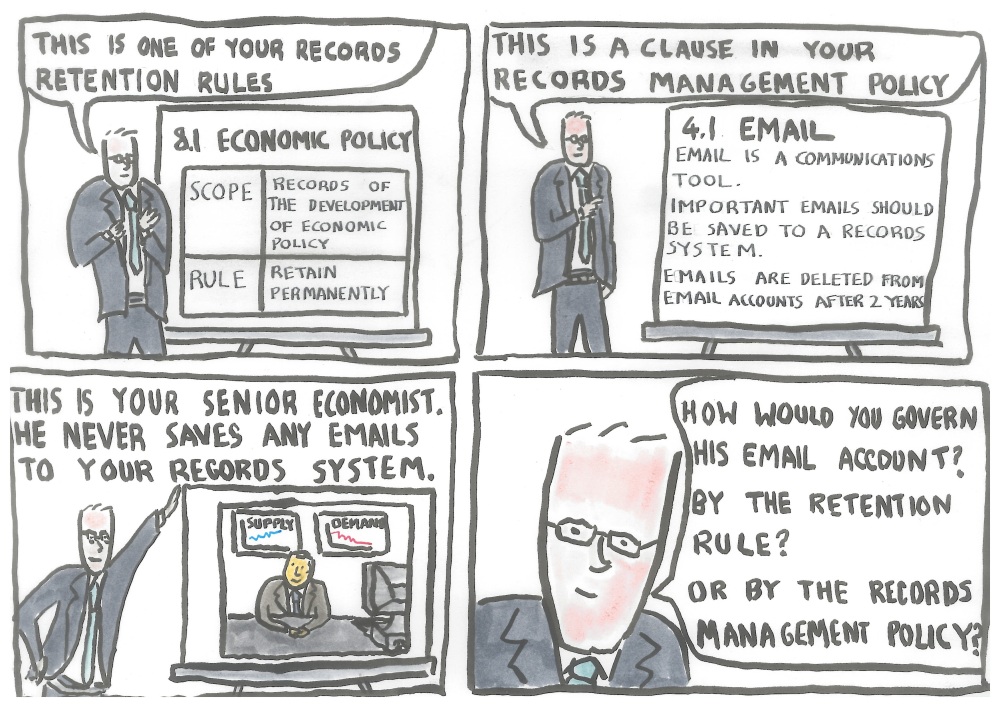

When I started telling people, back in 2015, that I had started a doctoral research project on email, my records management colleagues would typically smile, pat me on the shoulder and say ‘great! let us know when you have found the solution’.
Two years later. There is still no solution. Solutions do not drop out of the sky. Solutions emerge from people trying to fix things. If there is a broken situation and noone tries to fix it, it stays broken.
You do not have to undertake a doctoral research project to work out that organisations are not consistently capturing business email into systems that they designate as ‘records systems’.
Yes there are potential approaches. Not just one, many different approaches, suitable in different circumstances, using different technologies or different ways of harnessing human input:
- you could do what some CRM systems do and match the email addresses of external contacts with locations in your record system (when colleague a sends an email to person/organisation b it is about business matter x, when they email person/organisation c it is about business matter y etc.);
- you could set up one container in your record system to mirror each email account that you provision. You could give each email account owner a simple means of indicating for every email they send, whether or not they want that email and the thread it is part of to be saved as a record to the mirror container for their account in the record system;
- you could use analytics just before you run your routine deletion routine on an email account (after someone has left, or after two or three years) to rescue material which is obviously business related (and obviously not personal) from routine deletion.
We could go on and on with this list, you will have ideas of your own. We have not even mentioned machine learning yet.
But a solution for a problem is like a hammer waiting for a nail unless the problem owner wants the problem to be solved.
The problem owner for the email ‘problem’ is the organisation who owns the email accounts and the emails.
The one thing all of the above solutions have in common is that they all result in more emails being captured into record systems. All of these solutions therefore add to storage costs, they also add to the cost of servicing access to information requests, and, in highly politicised environments such as many central government departments, they add to the perceived risk of being forced to disclose potentially embarrassing content.
Email is therefore a problem that the problem owner percieves a benefit from leaving unsolved. Every conceivable solution to the problem of treating business emails as records would be more expensive, and would be perceived by the problem owner as being more risky, than the current approach. The current approach, if we are honest, is for organisations to make a token effort to persuade staff to save important emails as reords, who in turn make a token effort to occasionally place a few emails into a record system, whilst all the rest of the emails are routinely deleted after a designated but essentially arbitrary time period.
Where does this leave archivists and records managers? Where does it leave records management and where does it leave record keeping?
We are also in a manner of speaking the problem owner. The problem falls into our professional domain.
We are employed by organisations. It is not our job to try to pursuade our organisations to do anything that is against their perceived interests (and we would not get very far if we did try).
On one hand we are in a good situation. Organisations put us under no pressure to change our records management policy telling staff to move emails into the record system, and under no pressure to change the relationship between the email environment and our record system (which is typically a product primarily designed and configured for the capture and management of documents rather than emails).
On the other hand it puts us in a very difficult position. We go to all that trouble to develop corporate wide record systems and corporate wide records retention schedules (both labours of Hercules, demanding all of our professional skills, experience and energy) and yet we are regarded as failures because those systems and those retention schedules fail to embrace the bulk of an organisation’s business correspondence.
It is a problem that in effect we can do little about, because our organisations do not want to do anything about it. Take any of the ideas listed above to your organisation and you will see what I mean. Our vendor community cannot help us because our organisations do not want solutions that would result in them keeping significant volumes of email for significantly longer periods of time.
In the short term we can carry on like this. Our organisations are happy for us to continue to try and continue to fail. Because (and this is the paradox) our failure to capture business correspondence consistently into systems treated as record systems succeeds in reducing the cost and perceived risk of recordkeeping to our organisations.
But what about the long term? I fear in the long term that this success-through-failure damages our professional reputation and damages the clarity and moral force of our theory and of our practice.

